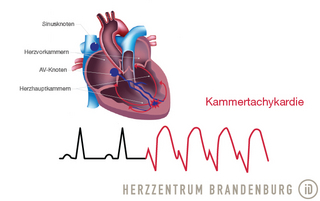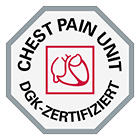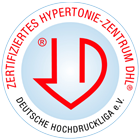Ventricular tachycardia (VT)
Ventricular tachycardia is a type of recurrent, malignant arrhythmia that originates in one of the ventricles of the heart. This type of arrhythmia can also benefit from ablation procedures.
What is ventricular tachycardia?
Ventricular tachycardias are usually life-threatening arrhythmias affecting the ventricles, which place the patient at risk of sudden cardiac death.
A type of VT referred to as monomorphic ventricular tachycardia, which has a regular pattern of occurrence and always originates from the same area in the heart, may be treatable using catheter ablation. Prior to commencing treatment, it is necessary to establish whether the patient has any underlying heart disease. Sometimes, treatment of an underlying condition will also have a positive impact on the patient's arrhythmia.
Very rarely, a patient may present with idiopathic ventricular tachycardia, a type of VT that occurs in the absence of other heart disease, and which usually responds well to catheter ablation.
Where can I find out more about ventricular tachycardia?
Deutsche Herzstiftung e.V. (German Heart Foundation)
Palpitations (racing heart)
www.herzstiftung.de
Deutsche Gesellschaft für Kardiologie (German Cardiac Society)
dgk.org
Deutsche Gesellschaft für Kardiologie (German Cardiac Society)
Pocket-Leitlinien Invasive elektro-physiologische Diagnostik, Katheterablation [pocket guidelines on diagnosis by invasive electrophysiology, ablation].
dgk.org






